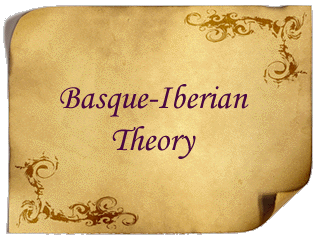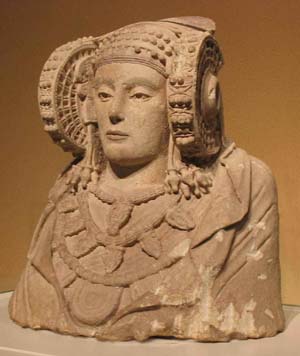
The Basque language has gathered and enlarged its vocabulary throughout history according to the different peoples that the Basques came in contact with and kept those terms just like they were received from their respective languages in most of the cases. It is significant that there are daily-use terms in the Basque language that can be found in the hieroglyphics of the Egyptian pyramids or in the speech of the Saharian Tuaregs. This similar vocabulary can be explained by means of the theory of the Proto-Basque expansion that took place after the last Ice Age, according to the migrations of Proto-Basques towards the Maghreb.
Some linguists hold that those similarities are due to a centuries-old relationship with a pre-Indo-European people, of a possible African origin, and whose presence in the Iberian peninsula was more recent than the Basque one: the Iberians. Those people came in contact with different peoples from Africa and Europe by means of the trade relations they established throughout the Mediterranean, what allowed them to acquire new terms that later would be transferred to Euskara, as a result of the geographical proximity of Iberians and Basques.

The closest relationship between both cultures took place specifically in Catalonia and in the Ebro riverbank during the pre-Roman age, where villages of both Basque and Iberian speech coexisted. Due to their similarities in phonetics and words, some linguists came to consider erroneously that Euskara and Iberian were the same language. This theory was soon abandoned when the respective texts could not be translated in the same way, although their syntax and grammar seemed to be similar. While the Aquitanian (archaic Euskara that was spoken in the Aquitanian area) personal names and gods that were inserted in Latin texts found in that region have been translated in a quarter by means of current Euskara, the Iberian texts of the same period, on the contrary, have only been translated in small part according to the vocabulary that Euskara and Iberian exchanged during centuries of coexistence.
There is considerable controversy about if the Iberians was a homogeneous people or whether the Iberian language was spoken throughout the peninsular and part of the French Mediterranean. The recent theories that are held today indicate that the pre-Roman peoples of the peninsula, which were included into the Iberian group, were in fact very different among them and they did not share many common features. Therefore, the Iberian language would be the own language of an Iberian people, of a possibly Mediterranean origin, and that achieved the highest level of political and commercial development, what allowed their language to be used by the rest of the peoples in the region to communicate themselves. For this reason, the Iberian language would have acted as a lingua franca that later would be replaced by Latin with the arrival of the Romans.
Iberian was an agglutinative language and seemed to have the same word order in the sentence, just the same as Euskara. The words have as well a similar aspect although the true correspondences are very few, what prevents the translation works of Iberian by means of the Basque language. Iberian was also very similar to Euskara concerning its phonetic system, with five standard vowels. On the other hand, its diphthongs seem to be: ai, ei, oi, ui, au, eu, iu. (Regardind the last one, note that the initial 'i' could have in fact a semivowel character and therefore, its pronunciation would have been 'yu'). On the contrary, a semivowel like 'u' between two vowels is hardly found in the Iberian system except for any linguistic loan, the same as what happened in archaic Euskara. Concerning the consonants, the table below show the possible Iberian consonants according to the current information available:
|
Strong / unvoiced |
(p) t k S mb ll-lt rr (R) |
|
Weak / voiced |
b d g s n l r |
Iberian did not have the sound /h/, which was very abundant in archaic Euskara. This way, it is possible to differentiate between Iberian and Basque anthroponyms and toponyms. The sound of /p/ was probably a pronunciation variant of /b/. Both simple and strong /r/ never appear at the beginning of the word, the same as Euskara, for what a prothetic vowel (/a/) is used to help the pronunciation of the word. Iberian did not have syllables like bla, tre, klo, etc. the same as archaic Euskara that on the contrary, were very common in the Indo-European languages. The Iberian names were compound, like the Greek, Hebrew and Germanic ones, but different from the Latin ones that were brief and meaningless. The Basque personal names were simple in most cases and sometimes derived (by means of suffixes that are added to the name they want to qualify. Those particles can be easily translated through current Euskara: -ko, -tar, -txo, etc.) Although the compound names are not very abundant, this structure is very common when dealing with the names of the Basque gods.
| Iberian |
Euskara |
English |
| Iliberris |
Hiri berri |
New city |
| Mbi |
Ni |
I |
| Salir |
Zilar |
In Iberian, it meant 'money'.
In Basque, it means 'silver' |
| Bios |
Bihotz |
Heart |
| Biskar |
Bizkar |
Back |
| Biur |
Bihur |
Twisted |
| Ildun |
Ilun |
Dark |
| Beles |
Beltz |
Black |
| Iltirbikis-en |
Gorkaren |
Iltirbikis' (Iberian personal name)
Gorka's (Basque personal name).
Both use the same desinence to build the genitive case. Some researchers consider that the Basque genitive -en was -e in Proto-Basque. |
| Arse(etar) |
Bilbo(tar) |
Both languages use the same desinence to build their demonyms |
The reason of part of those similarities is possibly due to the language that acted as a linguistic substratum, when the human group that later gave rise to the Iberian people arrived in its final settlement and received its influence. We refer to the Proto-Basque language. In this way, the origin of the Iberian people would be placed in the Catalonian or French Mediterranean and a parallel between Spanish and Iberian can be drawn, although with a difference of two thousand years. Spanish and Iberian would share the Basque substratum, but like Spanish and Basque do not have a common origin, Iberian and Basque do not either.
Share this page!

